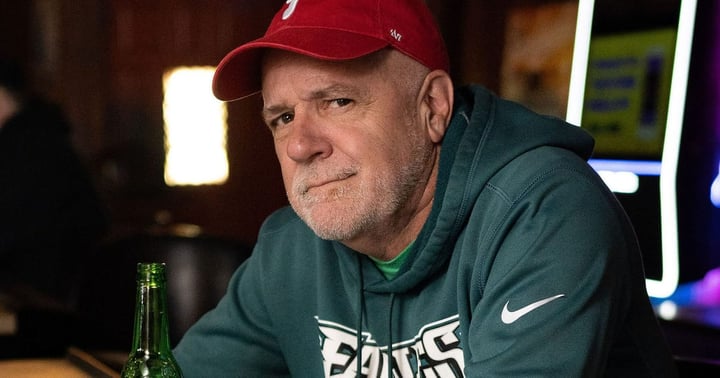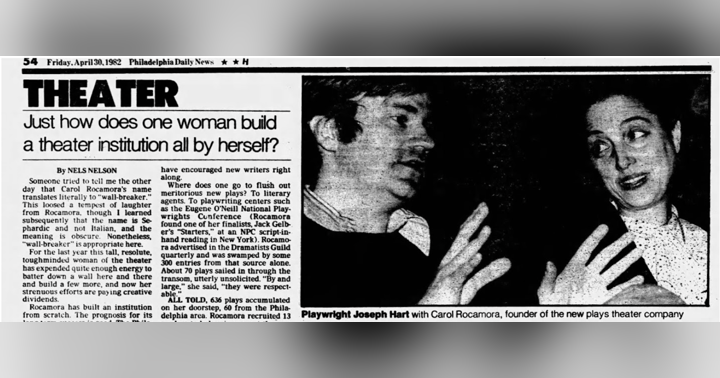
Above, a photo of Dick Shawn and Judi West in Scuba Duba - a production which played Paramus, NJ and Philadelphia PA in the summer of 1969.
July 1, 1969: The ban on Scuba Duba was lifted. Philadelphians could go see Dick Shawn do his stuff at Playhouse in the Park again.
The Bruce Jay Friedman farce, which had run successfully Off-Broadway, had been brought to Philadelphia by producer Shelley Gross. His organization Music Fairs, Inc., which owned summer theater festivals all across the region, was in charge of programming the Playhouse in the late 1960s.
But the Playhouse, which was owned by the City of Philadelphia, was under the jurisdiction of the Fairmount Park Commission - which meant that all their shows had to pass muster with Anthony J. O'Connell. (NOTE: in our interview with Tom Bissinger, he identifies the censor as Philadelphia Police Commissioner Frank Rizzo. We have not been able to confirm Rizzo's actions in this story - O'Connell is the person referred to in all contemporary news stories.)
O'Connell, a politically well-connected auto dealer in the Roxborough neighborhood of northwest Philadlephia, was a conservative Catholic. He was the sort of person who would make the newspapers by protesting about girlie calendars on display in his local gas station, or men walking around naked in gymnasium locker rooms. Having been appointed to the Fairmount Park Commission by Mayor James Tate, O'Connell became a self-appointed 'censor' of Playhouse productions, demanding that all 'smutty' action and language be removed.
Scuba Duba was just the sort of show which was guaranteed to drive O'Connell crazy. The plot was about a manic-depressive American man, Harold Wonder, (played by Shawn) living in the south of France, whose wife (Jennifer Warren), he thinks, has run off with a Black scuba diver (Morgan Freeman).
A sexually free-and-easy young woman (Judi West), who spends most of the play clad in a bikini, attempts to console him. His psychiatrist (George Bartenieff) tries more conventional therapies, though he is hindered by his own sexual obsessions. Other farcical situations - involving a French landlord and a local burglar - complicate matters even more. At the end Wonder learns that his wife is actually in love with an entirely different Black man, a poetic and mild character (Norman Matlock). Also in the cast was Rosalind Ross, Anna Berger - and Herve Villechaize in a role described in one review as "a midget thief." (We are, of course, BEREFT that, as of this writing, we are unable at to find ANY images of either Morgan Freeman or Herve Villechaize in this production!)
The play was billed as "wild, far-out farce," and contained lots of language that by the end of the 1960s was fairly common on stage - but many people in Philadelphia were not on board with the new ethos of the age. One woman angrily stormed out of the show, and yelled at the Daily News theater critic Jim O'Brien, "Put it in the papers, it's filth!"
Anthony J. O'Connell certainly agreed with her, and immediately decreed that the play was banned from the Playhouse stage - a decision which would be overturned the next day in a full meeting of the Commission, though on the condition that certain words - especially the one starting with F and ending with K - would be excised.
Director Tom Bissinger and star Dick Shawn shrugged - and simply inserted the word "censored" wherever the other word had once been. After all, Shawn, one of the funniest actors then working in showbiz, could just as easily get laughs by calling someone a "mother-censored son of a censored!" The production continued its weeklong run at the Playhouse - which of course was sold out, due to all the publicity the dispute gave it.
Bissinger, for his part, would soon raise OTHER controversies in Philadelphia, because he had just been appointed as the new Artistic Director of the Theatre of the Living Arts on South Street that same month. He had already had a controversial success in Philadelphia earlier that same year with La Turista . . . a play by Sam Shepard. (Though it had been performed in front of invited audiences at the American Place Theater in New York in 1967, this was first professional public performance of La Turista in America.)
The first act of the play depicts an American husband and wife - named after the cigarette brands Salem and Kent - traveling in Mexico. The man falls victim to the eponymous intestinal disorder, and a young Mexican who offers to help brings in a couple of native healers in full feathered regalia. A chicken is sacrificed, and its blood slung about. In the second act, they are back in the United States. The husband now suffers from "sleeping sickness," but more traditional American medicine is unable to save him. The dialogue is free-flowing and poetic, and the action ends with the husband running through the wall to escape reality. There are many references to American popular culture and foreign policy, and the Vietnam War is a constant subtext.
Tom Bissinger working with the TLA's current resident company - including Gloria Maddox, Lee Kissman, and a young Trenton-born actor named Michael Procaccino (who later, as "Michael Christofer," would become a successful actor, director, and the Pulitzer Prize-winning playwright of The Shadow Box.)
In a pre-production interview with the Inquirer, Procaccino admitted to originally having mixed feelings about the script: "The first time I read it I thought it was just terrible. I didn't understand it. I couldn't decide whether it was terribly new or just bad. Now I think it's a fantastic play, and it is new. It has its own logic, makes sense in its own terms. It's really a very American play about our strange isolation due to extremes. . . . For all the playwrights who are spewing profanities all over the stage, Shepard stands out with his beautiful speeches, but they aren't without obscenities," he conceded.
After the TLA's press opening for the show, the Evening Bulletin’s critic Ernest Shier called it "an interesting and lively production," but the Camden Courier-Post termed it "uneven." Charles Petzold, writing in the Daily News, wrote that the acting was "uniformly fine" and especially praised company member Gloria Maddox, whom he thought was "at her peak" in the production.
__________________________________
November 4, 1969: The Theater of the Living Arts opened its fifth season with a production of George Farquar's Restoration-era comedy "The Recruiting Officer." But it wasn't a reverent version of a classic play. New artistic director Tom Bissinger employed rock music, nudity, and lots of audience interaction.
Notable today to us was the presence of actors Sally Kirkland, Michael Procacinio, Judd Hirsch and Morgan Freeman in the cast, as well as the music of Michael Bacon (son of Philly city planner Ed Bacon, and brother of Kevin) and his group the Good News. Also in the company were David Rounds as Captain Brazen, and Marion KIllinger as Captain Plume.
Some of the reviewers on opening night were horrified by the production ("Vulgar" was the verdict of the Wilmington Morning Herald. "Muddled and confused," wrote the Daily News). In the Inquirer, however, critic William Collins was ecstatic, and was clear that the Vietnam War era context to a old play about an army recruiting campaign had hit home.:
"The company assembled by Tom Bissinger for his first production as artistic director at the South St. establishment radiated a joyful energy as they tackled the classic with everything from gunpowder to rock. There was an air of celebration to the event, something in the nature of a shipboard party at a midnight sailing, which with Bissinger's promise to pilot us into uncharted seas of theatrical pleasure."
"It was an evening for throwing confetti, beating the drum and singing a few songs and never mind if no one seemed to know exactly where they were going. . . .The success of the various comic effects - one of the best is a duel in slow motion with the voices sounding like a 45 rpm record played at 33 rpm speed - keeps the audience asking itself 'What will they do next?' instead of thinking about what they have just done."














